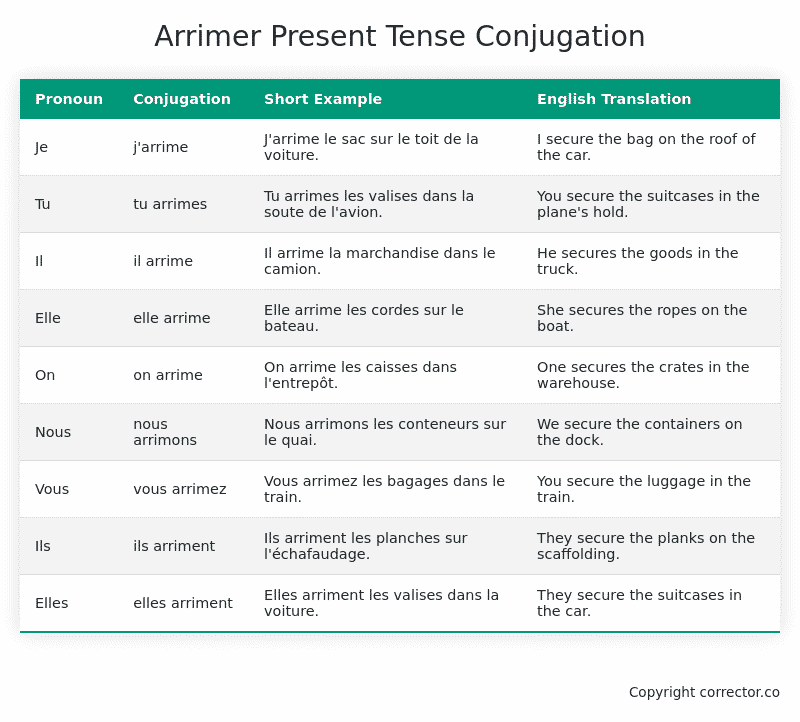Le Present (Present Tense) Conjugation of the French Verb arrimer
Introduction to the verb arrimer
The English translation of the French verb “arrimer” is “to secure” or “to fasten.” The infinitive form of “arrimer” is pronounced as “ah-ree-may.”
“Arrimer” comes from the Old French word “remier,” which means “to fasten,” and it is derived from the Latin word “remittere,” meaning “to send back” or “to put back.” In everyday French, “arrimer” is often used to describe the action of securing or fastening something, such as tying down objects, anchoring a ship, or securing cargo.
Examples:
-
J’ai arrimé les valises sur le toit de la voiture.
(I secured the suitcases on the roof of the car.) -
Les marins ont arrimé le bateau au quai.
(The sailors fastened/secured the boat to the dock.) -
Il faut arrimer les marchandises dans le camion pour éviter les dommages.
(We need to secure the goods in the truck to prevent any damages.)
Arrimer – About the French Present Tense
To take a deep dive into all the French tenses then see our article on Mastering French Tense Conjugation.
Common Everyday Usage Patterns For Le Present
Interactions with Other Tenses
Table of the Present Tense Conjugation of arrimer
| Pronoun | Conjugation | Short Example | English Translation |
|---|---|---|---|
| Je | j’arrime | J’arrime le sac sur le toit de la voiture. | I secure the bag on the roof of the car. |
| Tu | tu arrimes | Tu arrimes les valises dans la soute de l’avion. | You secure the suitcases in the plane’s hold. |
| Il | il arrime | Il arrime la marchandise dans le camion. | He secures the goods in the truck. |
| Elle | elle arrime | Elle arrime les cordes sur le bateau. | She secures the ropes on the boat. |
| On | on arrime | On arrime les caisses dans l’entrepôt. | One secures the crates in the warehouse. |
| Nous | nous arrimons | Nous arrimons les conteneurs sur le quai. | We secure the containers on the dock. |
| Vous | vous arrimez | Vous arrimez les bagages dans le train. | You secure the luggage in the train. |
| Ils | ils arriment | Ils arriment les planches sur l’échafaudage. | They secure the planks on the scaffolding. |
| Elles | elles arriment | Elles arriment les valises dans la voiture. | They secure the suitcases in the car. |
Other Conjugations for Arrimer.
Le Present (Present Tense) Conjugation of the French Verb arrimer (You’re reading it right now!)
Imparfait (Imperfect) Tense Conjugation of the French Verb arrimer
Passé Simple (Simple Past) Tense Conjugation of the French Verb arrimer
Passé Composé (Present Perfect) Tense Conjugation of the French Verb arrimer
Futur Simple (Simple Future) Tense Conjugation of the French Verb arrimer
Futur Proche (Near Future) Tense Conjugation of the French Verb arrimer
Plus-que-parfait (Pluperfect) Tense Conjugation of the French Verb arrimer
Passé Antérieur (Past Anterior) Tense Conjugation of the French Verb arrimer
Futur Antérieur (Future Anterior) Tense Conjugation of the French Verb arrimer
Subjonctif Présent (Subjunctive Present) Tense Conjugation of the French Verb arrimer
Subjonctif Passé (Subjunctive Past) Tense Conjugation of the French Verb arrimer
Subjonctif Imparfait (Subjunctive Imperfect) Tense Conjugation of the French Verb arrimer
Subjonctif Plus-que-parfait (Subjunctive Pluperfect) Tense Conjugation of the French Verb arrimer
Conditionnel Présent (Conditional Present) Tense Conjugation of the French Verb arrimer
Conditionnel Passé (Conditional Past) Tense Conjugation of the French Verb arrimer
Conditionnel Passé II (Conditional Past II) Tense Conjugation of the French Verb arrimer
L’impératif Présent (Imperative Present) Tense Conjugation of the French Verb arrimer
L’impératif Passé (Imperative Past) Tense Conjugation of the French Verb arrimer
L’infinitif Présent (Infinitive Present) Tense Conjugation of the French Verb arrimer
L’infinitif Passé (Infinitive Past) Tense Conjugation of the French Verb arrimer
Le Participe Présent (Present Participle) Tense Conjugation of the French Verb arrimer
Le Participe Passé (Past Participle) Tense Conjugation of the French Verb arrimer
Struggling with French verbs or the language in general? Why not use our free French Grammar Checker – no registration required!
Get a FREE Download Study Sheet of this Conjugation 🔥
Simply right click the image below, click “save image” and get your free reference for the arrimer present tense conjugation!

I hope you enjoyed this article on the verb arrimer. Still in a learning mood? Check out another TOTALLY random French verb present conjugation!


